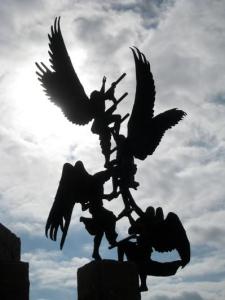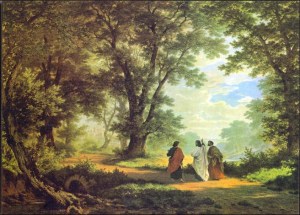We support our Publishers and Content Creators. You can view this story on their website by CLICKING HERE.
 The Gospel reading for this second Sunday of Epiphany (John 1:43-51) takes us to one of the most mysterious and beautiful moments in the New Testament. As the disciples begin to gather around Jesus, Philip finds Nathanael and says “We have found him of whom Moses in the Law, and the prophets did write, Jesus of Nazareth, the son of Joseph” (John 1:45) Nathanael’s unpromising response is ‘Can anything good come out of Nazareth?’ Nathanael is not alone in having this kind of bigoted and prejudiced attitude to ‘other’ places and people, as we have seen from the recent shameful outburst by the president of a great nation, but Phillip gives the best possible reply that anyone sharing the mystery of their faith can give; ‘Come and see’. and that ‘come and see’ sets a theme of ‘seeing’ and vision which culminates in the amazing exchange between Nathanael and Jesus that follows.
The Gospel reading for this second Sunday of Epiphany (John 1:43-51) takes us to one of the most mysterious and beautiful moments in the New Testament. As the disciples begin to gather around Jesus, Philip finds Nathanael and says “We have found him of whom Moses in the Law, and the prophets did write, Jesus of Nazareth, the son of Joseph” (John 1:45) Nathanael’s unpromising response is ‘Can anything good come out of Nazareth?’ Nathanael is not alone in having this kind of bigoted and prejudiced attitude to ‘other’ places and people, as we have seen from the recent shameful outburst by the president of a great nation, but Phillip gives the best possible reply that anyone sharing the mystery of their faith can give; ‘Come and see’. and that ‘come and see’ sets a theme of ‘seeing’ and vision which culminates in the amazing exchange between Nathanael and Jesus that follows.
Before Nathanael has uttered a word Jesus says ‘Behold an Israelite indeed’ and turns the tables of ‘vision’ onto Nathanael himself, and in that moment Nathanael suddenly knows that he is completely known by this man he has never met. ‘Whence knowest thou me?’ he asks, and Jesus’ reply is again about vision and seeing: ‘Before that Philip called thee, when thou wast under the fig tree, I saw thee.’ Something amazing happens here, Nathan, who was scoffing at Nazareth a minute before, has a sudden leap of understanding, outpacing reason or teaching, leaping ahead of all the other disciples to an undertanding and certainty that even Peter would not attain for another three years, and declares ‘Rabbi thou art the Son of God, thou art the king of Israel!’
An Epiphany has taken place, something whole and complete has been disclosed in a single glance, to see and be seen is enough! This is an example in the Gospel of a sudden ‘awakening’, a direct pointing to reality, which some people think is only associated with Buddhism, but here it is. And then Jesus, alluding subtly to Nathanael’s mention of Israel, promises that this is just the beginning of a greater epiphany. Nathanael is ‘an Israelite indeed’ and Jesus points to the key epiphany in the life of Israel, when he was still called Jacob, the epiphany in which he saw the ladder connecting heaven and earth:
‘Verily, verily I say unto you, Hereafter you shall see heaven open and the angels of God ascending and descending upon the Son of man’
Here is one of those thrilling moments when a mysterious image from the Old Testament finds its fulfillment in the New! The ladder was a prophetic image given in a dream to Jacob of what is to come, now it has come true! I am the ladder, Jesus is saying, the true connection, the true gate of Heaven. And in this intimate exchange Nathanael has seen with his waking eyes what his ancestor had seen only veiled in dream and symbol!
I have tried to embody something of these reflections in the following sonnet. I am grateful again for Margot Kreb’s Neale’s beautiful photograph, itself a commentary on this same mystery. The poem itself is from my collection Sounding the Seasons, published by Canterbury Press and available on Amazon or from your local bookshop.
Nathanael’s Epiphany
A fugitive and exile, Jacob slept,
A man of clay, his head upon a stone
And even in his sleep his spirit wept
He lay down lonely and would wake alone.
But in the night he dreamt the Heavens parted
And glimpsed, in glory, as from Heaven’s core,
A ladder set for all the broken-hearted
And earth herself becoming Heaven’s door.
And when the nameless Angel named him Israel
He kept this gift, whose depth he never knew;
The promise of an end to all our exile,
For now a child of Israel finds it true,
And sees the One who heals the deep heart’s aching
As Jacob’s dream becomes Nathanael’s waking.
And here also is a link to the podcast of a sermon inspired by this story and concluding with this poem:
Republished with gracious permission from Malcolm Guite’s website.
The Imaginative Conservative applies the principle of appreciation to the discussion of culture and politics—we approach dialogue with magnanimity rather than with mere civility. Will you help us remain a refreshing oasis in the increasingly contentious arena of modern discourse? Please consider donating now.
The featured image is courtesy of
Share This Story, Choose Your Platform!
Go to Top

 Conservative
Conservative  Search
Search Trending
Trending Current News
Current News 






